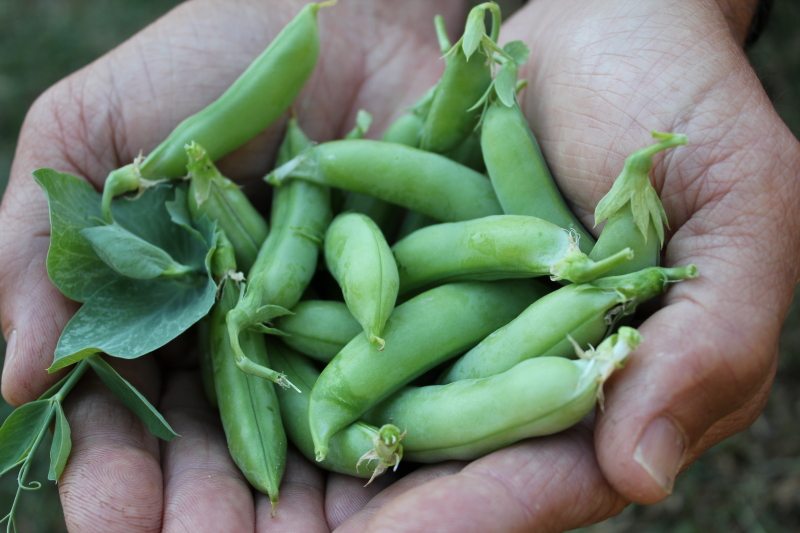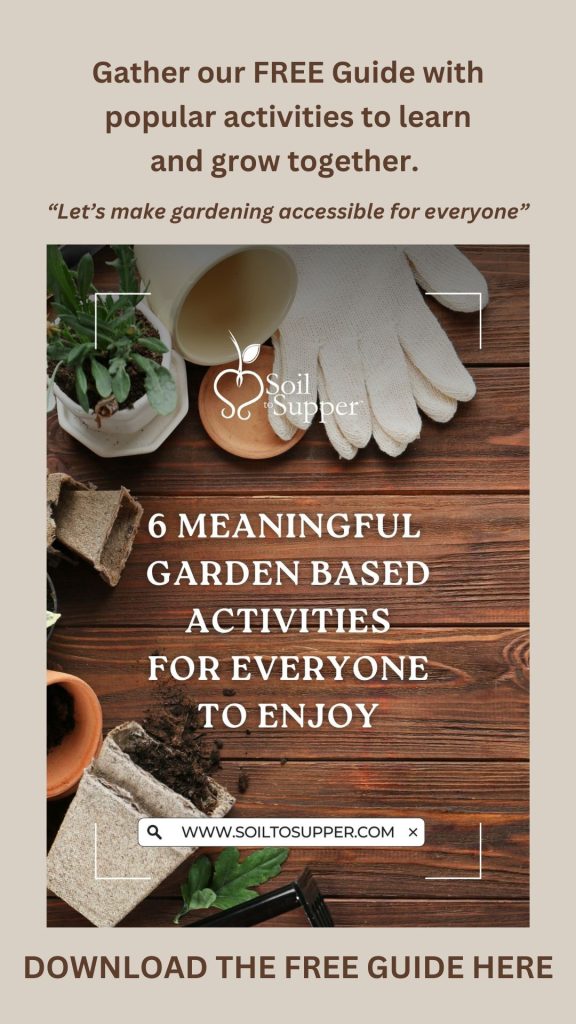I have recently completed a series of Workshops through Sunshine Coast Libraries called ‘Forever Food‘ 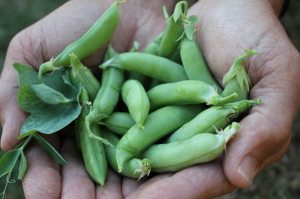
I had a wonderful time at every location and met many lovely people who also have an interest in sustainable organic gardening.
Thanks to Sunshine Coast Council and the Living Smart Program.
Details here – www.livingsmartqld.com.au
As mentioned, here are the notes from the sessions for anyone who missed the Workshops or would like a refresher of what we covered…
Enjoy!!
Simple ways to enjoy fresh, healthy food year round…(suitable for temperate, sub-tropical and tropical climates)
Consider these elements of Sustainable Organic Gardening –
- Soil Health
- Growing Perennials
- Plant Requirements
- Succession Planting
- Crop Rotation
- Organic Gardening Methods
- Garden Care
Soil Health…Why is this so important??
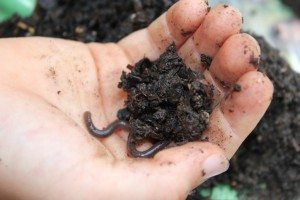
The benefits of healthy soil are –
- Healthy plants
- Nutrient packed food
- Less pests & diseases
- Longer growing period
- Higher production of food
- Higher levels of organisms = more plant food!
For more information on healthy soil read my article here - The Other World Wide ‘Web’
Composting and No-Dig Methods here - Do you know how to Compost? and How to Build a No-Dig Garden
Growing Support Species
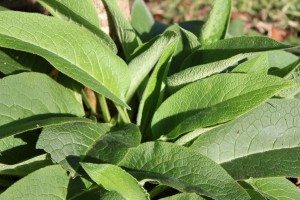
Plants to grow to support your garden, soil health and for many other uses…
- Comfrey
- Pigeon Pea
- Arrowroot
- Nasturtiums
- Lemongrass
- Vetiver
- Popcorn Cassia
For information on purchasing plants and seeds refer to www.greenharvest.com.au
Growing Perennials…plants that live forever!!
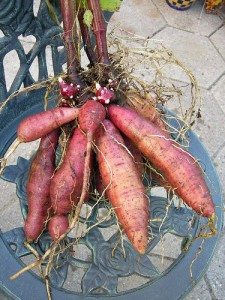
Growth Habit of Plants
- Annuals have one growth cycle only then die (or eaten!!)
- Biennials bloom in the second cycle of growth and then die
- Perennial has many growth cycles or continual growth
Perennials provide fresh food for longer periods of time without having to replant constantly.
Some examples of Perennials we discussed are…
Yacon, Madagascar Bean, Brazilian Spinach, Sweet Potato, Arrowroot, Bananas, Citrus…plus loads more!
Growth Factors…what do plants need to grow??
All plants need suitable light, correct temperature, water, correct pH, soil type and nutrients.
This varies between plants so it’s a good idea to get to know your plants needs.
Also consider the current season and your climate when choosing plants. This will ensure your plants grow healthy and produce food to enjoy.
Succession Planting…keep the food coming!!
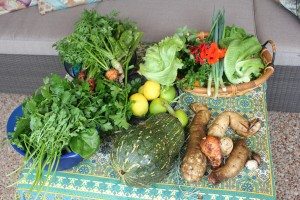
“Farmers use succession planting to ensure a constant supply of vegetables to take to market; you can use it to produce a consistent supply of vegetables to take to your table.”
To do this…
- plant what you’d like to grow and eat
- approx. every 4 weeks replant more annuals
- sow seeds to help with continuous supply
- Replant in spaces as plants are removed
- Add compost, fertiliser & fresh mulch when replanting
This is simple & effective method for maximizing your garden’s yield.
Crop Rotation
To keep it simple…
Crop Rotation is avoiding growing the same plant family in the same garden each season.
By rotating crops to another garden bed this helps to prevent nutrient deficiencies in soil and also pest & disease problems.
Get to know plant families and how they grow. Some examples are…
Solanaceae – tomato, eggplant, potato, capsicum
Leguminosae – peas, beans, broad beans
Lilliaceae – onions, leek, shallots, spring onions, garlic
Brassicaceae – broccoli, cauliflower, cabbage, kale, bok choy, rocket, mustard greens
Asteraceae – lettuce, endive, marigold, calendula, dandelion, sunflower, artichoke
Apiaceae – carrot, celery, parsley, coriander, fennel, dill
Organic Gardening Methods
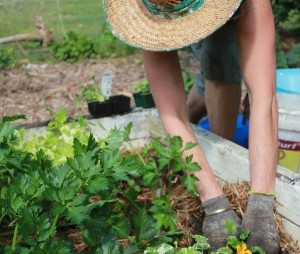
For a healthy garden and healthy food always apply Organic Gardening Methods!!
- No chemicals in gardens or homes
- Use only organic matter & organic products in gardens
- Compost or vermiculture for food scraps
- Companion Planting
- pH test soil twice per year
- Mulch gardens & trees
- Keep green waste – it’s a resource!!
- Treat weeds and pest & disease problems naturally
For natural home-made recipes refer to this link - A Thriving Garden
Garden Care…you’ve gotta nurture it!!
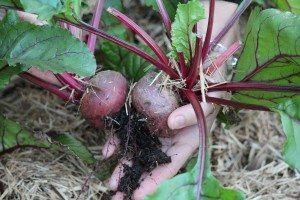 An important part of a healthy & productive garden is regular care. Simple tasks help your garden grow, such as –
An important part of a healthy & productive garden is regular care. Simple tasks help your garden grow, such as –
- Harvesting - you want to enjoy everything you’ve grown and also harvesting crops encourages new growth on perennial plants and that means more food
- Feeding – have a fertiliser plan for each season, eg 4 x per year
- Mulching – stops weed growth and assists moisture & nutrient retention
- Weeding – hand weed, remove weed seeds or sheet mulch large areas
- Pruning – promotes new growth, keeps trees & shrubs at suitable size for harvesting
- Staking – encourages plants to grow in correct form
- Tool care – good for garden care, removes pests & diseases
- Irrigation systems – regularly check lines, sprayers and drippers. Good for water saving
If you’re in your garden regularly then you’ll see the jobs that need doing.
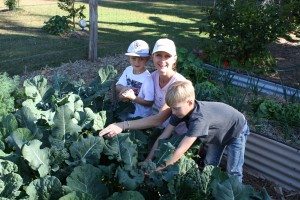 “Our gardens respond to nurturing and care just like us. If you spend time in the garden, enjoying all the abundance and connecting with nature then you’ll have a healthy & productive garden.”
“Our gardens respond to nurturing and care just like us. If you spend time in the garden, enjoying all the abundance and connecting with nature then you’ll have a healthy & productive garden.”
I mentioned the article from my Workshop earlier this year at Yandina Community Gardens...here it is - Preparing your Garden for Autumn Growing
‘Biophillia’ We have a natural connection with nature and plants.
Health & well-being is improved by spending time in the garden …Give it a try !!
More information on health and well-being here –Gardening Improves Emotional Well-Being
The Sowing Serenity Horticultural Therapy Program information on the website - sowingserenity.com.au
Thank you so much to everyone who attended these Workshops. I had a wonderful time with you all and look forward to more sessions again next year!
If you need help with your garden remember that little voucher you were given…so call me.
Cath ♥
© cath manuel 1 december 2014

